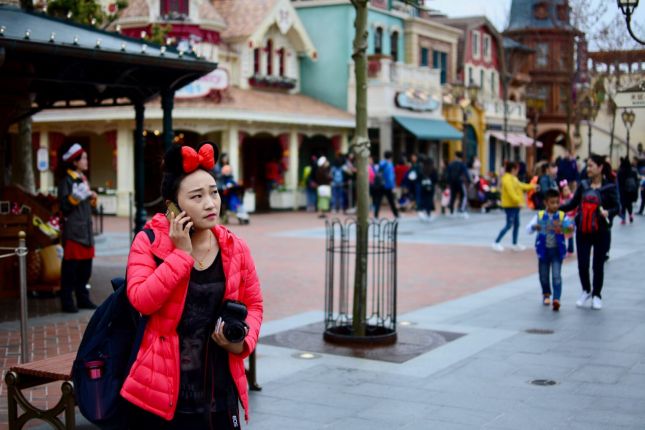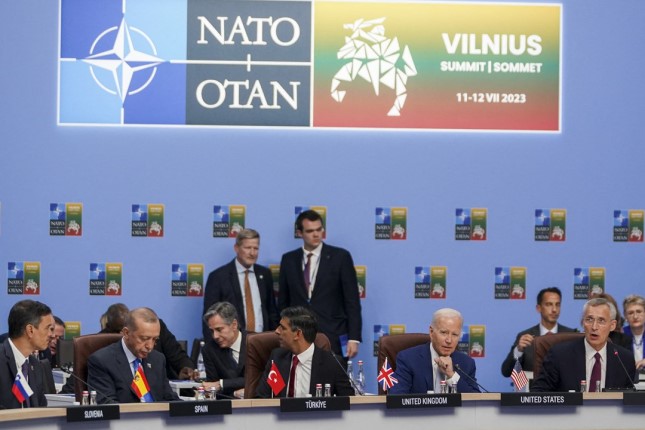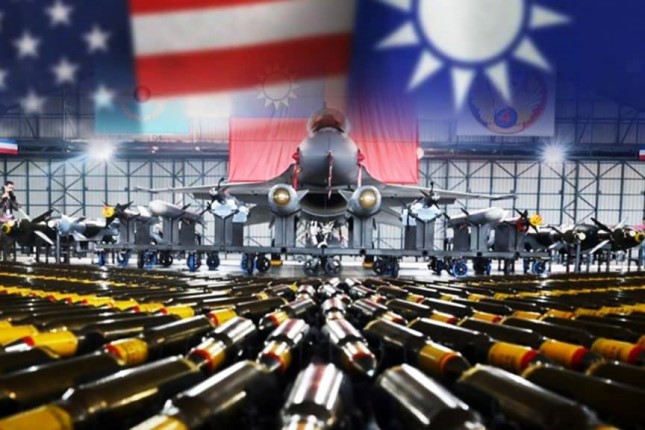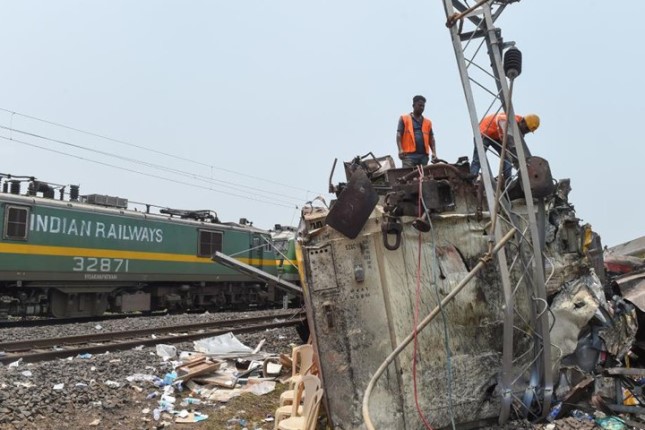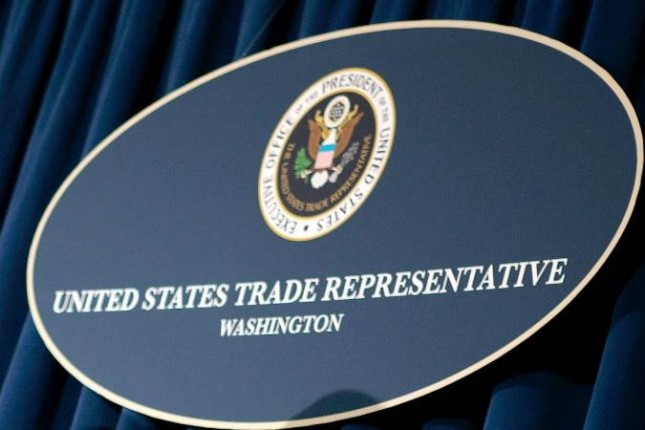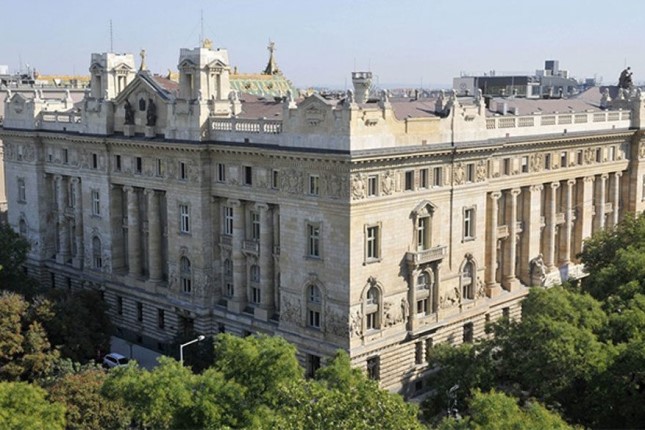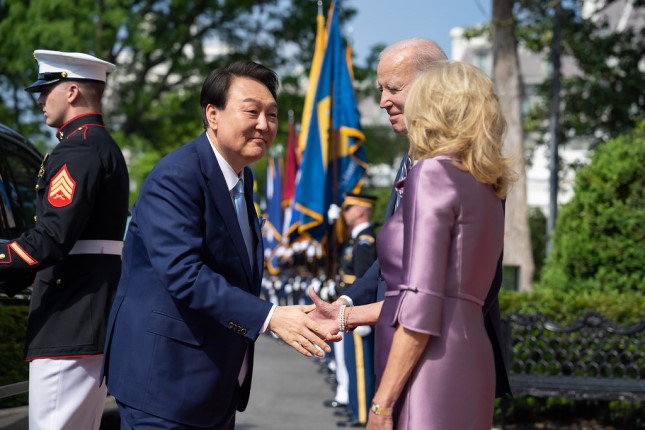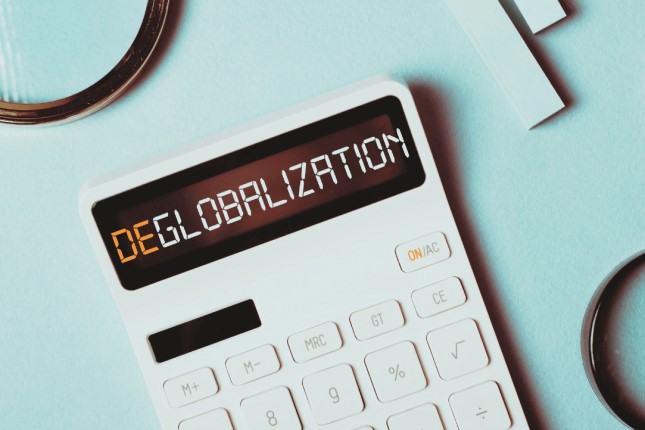The Biden regime's robotic procession to Beijing proceeds apace. Following Antony Blinken's fruitless visit in mid–June, U.S. taxpayers have paid Janet Yellen's airfare for another fruitless visit, and following Yellen it was the same for John Kerry. This week it is Gina Raimondo's turn. The secretary of state, the treasury secretary, the chief climate envoy, and the commerce secretary: What is the point of this parade?
I cannot but wonder whether these officials are dispatched across the Pacific in descending order of competence. Raimondo, who previously flopped as governor of Rhode Island — except for her plan to cut civil service pensions, an unfortunate success — is mediocrity made flesh. The Chinese must be wondering, with chagrin or amusement or both, who the Biden regime will next send their way.
The assignment in all these cases is the same: It comes down to "two seemingly contradictory responsibilities," as The New York Times's Ana Swanson put it in a curtain-raiser last week. She described "a mandate to strengthen U.S. business relations with Beijing while also imposing some of the toughest Chinese trade restrictions in years."
This is succinct, although we can live without the "seemingly." Proposing to conduct routine business while sabotaging China's competitive position in advanced technologies is prima facie a ridiculous idea. But the Times must have its "seemingly," because it is imperative we pretend the Biden regime thinks sensibly and means well in its relations with the People's Republic.
Sticking by the Neoliberal Catechism
Blinken got nothing done, Yellen got nothing done, Kerry got nothing done, and in Raimondo's case it is hopeless. The final item on her itinerary is a visit to Disneyland in Shanghai, and you have to credit the secretary's scheduler for the parting reference to dreams and fantasy.
An English friend observes that Americans are doing a lot of blinkin' and yellin' across the Pacific these days. Fair enough, but I think it is more of the former than the latter for the time being. This administration simply has no idea what a sound China policy would look like.
What is this all about? For a long time now I have concluded that Biden's foreign policy people match the definition of insanity commonly but mistakenly attributed to Einstein. These people seem to be doing the same thing again and again while expecting a different outcome. But with Raimondo's visit to Beijing this week I have to revise this assessment.
Those running Biden's national security policies are unimaginative ideologues petrified of diverging from the neoliberal catechism, yes, but they are not insane. I start to see in their dealings with Beijing a diabolical design to which the Chinese are very right to object.
The Biden administration's China strategy comes down to parrying, in a word. All the pointless talk is intended to obscure a concerted effort to undermine China's economy because the U.S. cannot compete with it in various strategic sectors, while — part two — buying time to move maximum U.S. military hardware as close to the mainland as possible under the program the Defense Department named a few years ago the Pacific Defense Initiative, the PDI.
At the horizon, we are likely to see Washington's trans–Pacific military ambitions trump longstanding trade and investment relationships. This is what "decoupling" and now "delinking" are all about. They are warnings to the corporate and financial sectors that their interests, which came first in the decades after the Dengist reforms of the 1980s, will no longer take precedence as the new Cold War Biden constantly denies provoking destroys relations with the mainland.
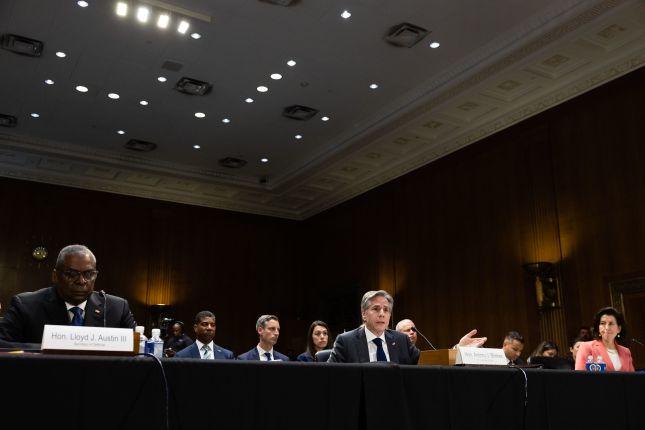
Raimondo, on right, as Blinken addresses a Senate budget committee meeting focused on the U.S.-China Relationship, on May 16. Defense Secretary Lloyd Austin on left. / State Department/Chuck Kennedy/Public domain
Two years ago Raimondo gave an interview to CNBC, the financial news network, that more or less announced the Biden regime's intention to subvert key sectors of China's economy. She was about to address something called the U.S.–E.U. Trade and Technology Council and told her interlocutor, "If we really want to slow down China's rate of innovation, we need to work with Europe."
It is useful once in a while to have dumbheads such as Raimondo in high positions, because, without meaning to do so, they can tell you so much more than you are supposed to know.
Slowing down China's impressive advances in high-technology sectors was precisely Washington's intent by the time Raimondo spoke. The Commerce Department under her direction has since imposed a wide variety of restrictions on U.S. exports to China of semiconductor chips, software systems, and the machinery used to produce both.
As Ana Swanson reports, Raimondo is likely to pile on more of these as soon as she returns from Beijing.
Sullivan Set the Tone

National Security Adviser Jake Sullivan aboard Air Force One with President Joe Biden on a domestic flight on March 13. / White House/Adam Schultz
The Biden regime dresses up this profoundly undignified conduct as "narrowly targeted" to technologies that could be of use to the Chinese military. Jake Sullivan set the tone for all of these visitors to Beijing in a speech at the Brookings Institution last April.
"We are imposing necessary restrictions on specific technology exports," the national security adviser explained, "while seeking to avoid an outright technological blockade. … The administration intends to maintain a substantial trade relationship with China."
This is what Raimondo and all of those who preceded her to China say when explaining their intent: Washington's sole concern, as Raimondo imposes her regime of restrictions, is national security, and all else can proceed rosily. It is hard to think of a flimsier dodge.
By this standard, she would have to restrict sales of Juicy Fruit gum to the Chinese. What the Biden administration is doing comes down to securitizing the economic relationship. If you have ever doubted that the United States is a failing imperium unwilling to accept 21st century realities, I offer this as proof of the proposition.
The Chinese know this and have said so many times. I no longer think Blinken, Yellen, et al. have any thought of persuading them otherwise on these journeys. That only looks like their intent.
Their true purpose is in the way of theatrical, and Americans are their true audience: They must make sure Americans do not understand Gina Raimondo's efforts to punch the Chinese, well below their belts, for what they are: an uncompetitive nation's attempts to hold back a rising economic power.
I found that speech Sullivan delivered last spring interesting for what he left out, as much as for what was in it. There was not a single mention of the U.S. military buildup at the western end of the Pacific.
Talk about elephants in the living room. The Pentagon is developing the Australian–British–U.S. alliance known as AUKUS; there is the Quad group, comprising the U.S., Australia, India, and Japan; there are these recently and assiduously fortified alliances with Seoul, Tokyo, Manila and Canberra, and none of this, we hear again and again, has anything to do with surrounding China or providing for the movement of U.S. military capabilities westward toward the mainland. This is only "seemingly" the case, as the Times would put it.
Raimondo's Tech Projects
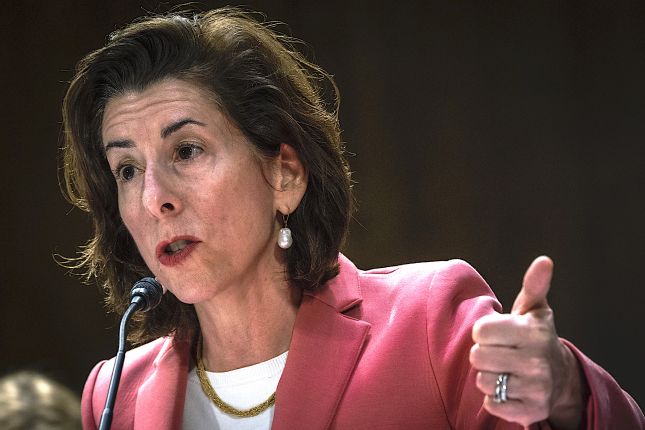
Raimondo at Senate hearings on the U.S.-China Relationship in May. / DoD,Chad J. McNeeley
It is the same as with Raimondo's projects on the technology side: Neither the Chinese nor anyone else in Asia believes these silly explanations, and no one expects them to do so. Beijing knows very well there is a point to all these apparently pointless visits U.S. officials insist on making.
The Biden regime is buying time as it remilitarizes the western end of the Pacific.
The only people who are supposed to understand otherwise are Americans, who are not supposed to watch as Washington provokes and prosecutes Cold War II. Americans are supposed to watch as U.S. officials — reasonable, constructive, well-intended —make all efforts to talk to the Chinese in the face of their stubborn reluctance to cooperate.
This is my revised take on the Blinken–Yellen–Kerry–Raimondo cavalcade across the Pacific. These people are not clods. They are purposefully malicious and, it should go without saying, are making the world even more dangerous than it already is.
There are two things to think about here. One, the Biden regime's efforts to obscure what it is up to at the other end of the Pacific is a straight reprise of the first Cold War, which now resides in all but the most important history books as the responsibility of the Soviets. We have a responsibility to render and defend an accurate record so that this does not happen again.
Two, there is this administration's immense betrayal of Americans as it aggresses in the Pacific, along with the numerous lost opportunities of which Americans are deprived.
You will find in that Jake Sullivan speech grand and plentiful references to the revival of the American middle class, bipartisan unity and other such elevated thoughts. Read the speech and then ask: What is this nation's leadership doing in the cause of a competitive America?
Is it redoubling efforts to educate the people or is it, diabolically, shutting down access — see the University of West Virginia — to liberal arts education?
What is it doing to produce the doctors and scientists who are needed to guide the way in the 21st century?
What is it doing to bring the dispossessed into the economy, address drug addiction and all the other debilitating social ills?
What is it doing — seriously doing, I mean — to repair and build out the infrastructure Americans need? Nothing or not enough are my answers.
The Chinese challenge could and should be understood as a chance to reinvent America by way of a Great Mobilization, cap "G," cap "M," of New Deal magnitude. There is, of course, no more than lip service to any such idea.
We are instead sacrificing this historic opportunity to the military-industrial complex, the greed of corporations, and the ambitions of political leaders who lack all principle or any thought for the commonweal.
Maybe you think, as I do, that none of the Biden officials flying off to Beijing is serious about the true work to be done in U.S. relations with China, or is competent to do it.
We must consider, bitterly, that they are perfectly representative of our circumstances as defined by a leadership that is more or less across the board unserious and incompetent to meet the great challenges of our time — China merely one among many.
Main photo: Shanghai Disneyland, 2017. © Iiii I I I, Wikimedia Commons, CC BY-SA 4.0
Patrick Lawrence, a correspondent abroad for many years, chiefly for the International Herald Tribune, is a columnist, essayist, lecturer and author, most recently of Journalists and Their Shadows. Other books include Time No Longer: Americans After the American Century.
Source: Consortium News
